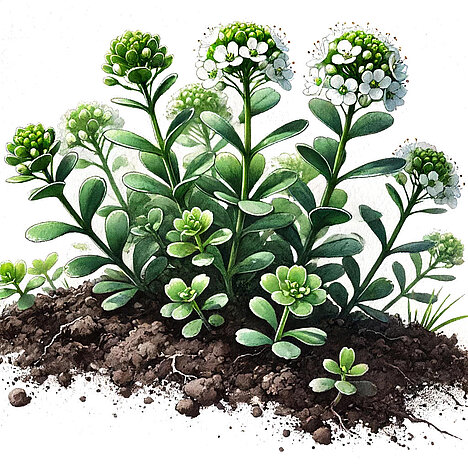Ribbon flowers

What are ribbon flowers?
An introduction to the genus Iberis
Ribbon flowers belong to the cruciferous family (Brassicaceae) and comprise around 30 species, mainly native to the Mediterranean region. They are known for their attractive white, pink or purple flowers, often arranged in umbrella panicles, which adorn garden beds and borders in spring and early summer. Iberis species vary from annuals to perennials and thus offer a variety of design options in gardens and parks.
Benefits and attraction
Ribbon flowers are not only popular for their beauty, but are also valued for their ease of care and drought tolerance. They attract pollinators such as bees and butterflies, making them an important plant for maintaining biodiversity in domestic gardens.
Benefits of ribbon flowers in relation to dogs
Aesthetic value and well-being
The presence of ribbon flowers in the garden can have a calming effect on dogs, in a similar way to humans, by creating a pleasant environment. Observing butterflies and bees attracted to these flowers can also provide a form of entertainment and mental stimulation for dogs.
Low toxicity risk
Compared to many other garden plants, ribbon flowers have a relatively low toxicity risk to dogs. However, this does not mean that they are completely safe, and further discussion of possible disadvantages is needed.
Possible disadvantages and precautions
Potential health risks
Despite the generally low toxicity risk, loopworts, especially in large quantities, can cause gastrointestinal distress in dogs if they consume parts of the plant. Symptoms may include vomiting, diarrhea and discomfort.
Allergic reactions
As with any plant, there is a possibility of allergic reactions to ribbonflower. Dogs that are particularly sensitive to plants could develop skin irritation or other allergic symptoms if they come into contact with the plant.
The need for supervision
It is important to supervise dogs in the garden, especially if they are prone to exploring or eating plants. Although ribbon flowers pose a low risk, it is better to be safe than sorry to avoid potential health problems.
A colorful compromise
Ribbon flowers offer a delightful addition to any garden, with potential benefits to our dogs' wellbeing by creating a visually appealing and calming environment. Nevertheless, it is important to recognize the potential risks and take steps to ensure the safety of our dogs. Careful plant selection and monitoring our dogs' behavior in the garden can help to enjoy the pleasures of the outdoors without taking unnecessary risks. Ultimately, incorporating ribbon flowers into dog-friendly gardens requires a balanced approach that takes into account both the beauty of the plant and the health and safety of our faithful companions.
If you notice any signs of hypersensitivity or poisoning in your dog, you should see your vet immediately. We are not a substitute for a vet, but we try to be as accurate as possible. Every dog reacts differently and we recommend you get a second opinion or consult your vet if in doubt.
Stay healthy and take good care of your four-legged friend!😊